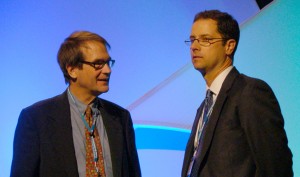The new president of the UAW is calling on non-unionized auto companies in the U.S. to offer to their employees the opportunity to join the union.
Making his first public remarks since ascending to the presidency in June, Bob King said at the Management Briefing Seminars in Traverse City that the United Auto Workers wants to see workers across the world have the right to organize to obtain better working conditions, pay and benefits. To do that, he wants to start at home, focusing on transplant automakers, all of which are currently not unionized.
The UAW of course has been spectacularly unsuccessful in doing so for generations now, and in fact has just lost its only unionized plant with an offshore maker, a joint venture in Fremont California between General Motors and Toyota.
“We want workers to have a free, democratic choice,” King said. “That doesn’t happen in America today.”
King said he would prefer to work cooperatively with employers to offer unionization to companies. But he repeatedly said that if the companies won’t work with the union, the UAW won’t be afraid to fight. The question is how?
“We offer respect and we expect respect in return,” King said.
If employees turn down unionization in a fair election, the union will respect that, King said.
Fighting to build the middle class is at the core of what the UAW has done since it was founded 75 years ago, King said.
King said that the UAW has shown a willingness to work cooperatively with the Detroit Three automakers, making the controversial decision to accept concessions. Now, General Motors, Ford and Chrysler have all shown signs of sustainability. Additionally, quality scores show that UAW workers are helping to build quality products, he said.
If they agree to unionize, King said the companies will see that the UAW can help make their employees more knowledgeable and show them how to work better.
Reporters specifically asked King about Toyota, which has the most U.S. plants of any Japanese automaker. He said that Toyota is a great company, but it’s one that has lost its way in recent years. He hopes that Aiko Toyoda, the company’s CEO and grandson of the company’s founder, will be able to turn it around. King compared Toyoda to Bill Ford Jr., who has led a resurgence of the family company founded by his great-grandfather Henry Ford.
Industry observers will point out the spin in such a statement; the Ford comeback, by now means assured and supported with billions of dollars of taxpayer money, occurred when Bill Ford stepped aside to bring in outside management from Boeing.
King said the UAW board has not decided how it will proceed on carrying out its campaign and whether Toyota would be the first target.
“We know that Toyota is a great company,” King said. “We can make it greater.”
During the last couple of decades, as the domestic auto industry has shrunk, the UAW shrunk with it, declining from 1.5 million members in 1979 to about 20% of that. UAW workers were characterized as overpaid, inflexible and lazy.
But King said the UAW has made strides, which has resulted in the recent quality gains. In addition, the union president said UAW has shown an ability to help automakers make quick changes to react to changes in market conditions.
“We’ve done a bad job on how flexible we are,” King said.
Soon after his June election, King said organizing workers at Toyota’s U.S. plants was the union’s top priority. In fact, at the time he charged Toyota with closing its Fremont, California plant just because it was unionized, the only union plant in the company.

